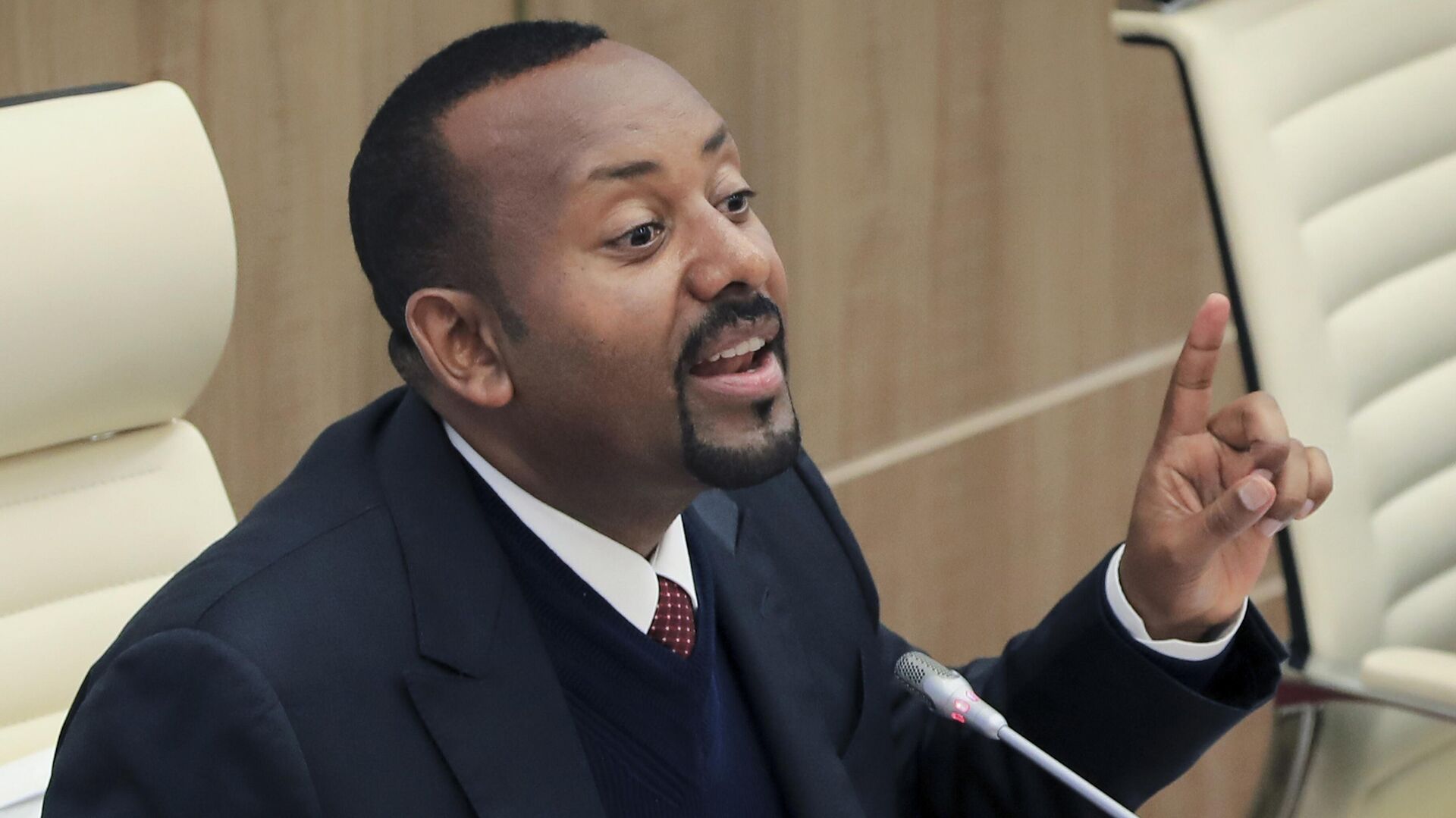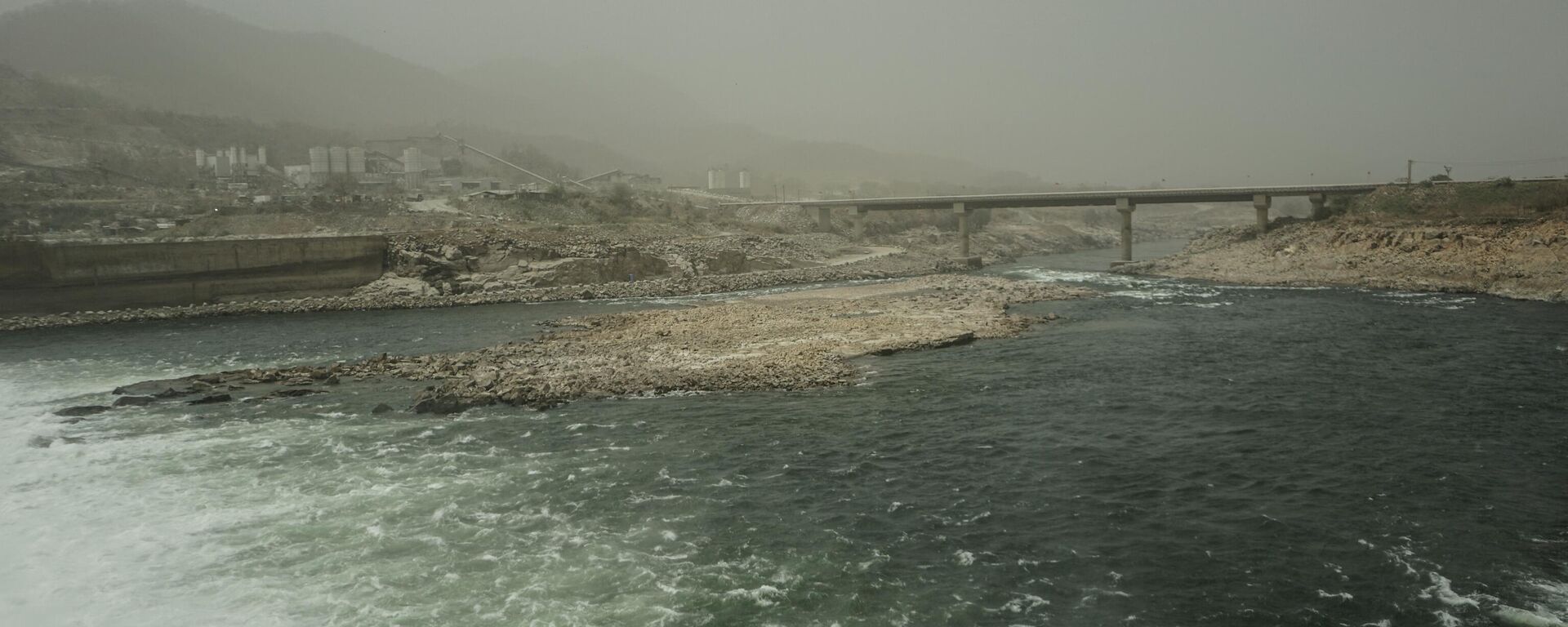https://en.sputniknews.africa/20231016/ethiopia-is-entitled-to-peacefully-claim-sea-access-countrys-pm-says-1062830361.html
Ethiopia is Entitled to Peacefully Claim Sea Access, Country's PM Says
Ethiopia is Entitled to Peacefully Claim Sea Access, Country's PM Says
Sputnik Africa
Ethiopia, located in the Horn of Africa, does not have access to sea. The closest one to the country is the Red Sea, connecting the Indian Ocean and the... 16.10.2023, Sputnik Africa
2023-10-16T12:40+0200
2023-10-16T12:40+0200
2023-10-16T12:40+0200
abiy ahmed
ethiopia
horn of africa
east africa
eritrea
djibouti
united nations (un)
water security
water resources
https://cdn1.img.sputniknews.africa/img/07e7/0a/10/1062836886_57:0:3698:2048_1920x0_80_0_0_ca115b37ec7eb031bb92c44c4c2d398a.jpg
Ethiopia has the right to have access to the sea through peaceful means due to geographic, historical, and economic reasons, Ethiopian Prime Minister Abiy Ahmed said in a televised program held with members of the country's parliament on Sunday, according to the state Ethiopian News Agency (ENA).The East African state lost the access to the Red Sea when Eritrea, with the territory along the coastline of the sea, gained independence in 1993. The referendum for the Eritrean independence was held following the war in 1961-1991 between Ethiopia and the then-Eritrean constituent state of the Federation of Ethiopia and Eritrea, which was created by the resolution of the United Nations in 1952 after the Second World War.Since 1993, Ethiopia has been dependent on Djibouti in terms of sea access. According to media reports, 70% of the cargo at the Port of Djibouti is shipped to or from Ethiopia, accounting for over 95% of the landlocked country's foreign trade in 2021.In addition, the prime minister reportedly noted while Ethiopia keeps silent about the port access to the Red Sea, other states are entitled to talk on the Grand Ethiopian Renaissance Dam (GERD) on the Nile River and other transborder rivers, which seems paradoxical.In 2012, the East African state launched the construction of the GERD on the Blue Nile, the chief head stream of the Nile by water volume, which rises in the Lake Tana in northwest Ethiopia. The project has become the source of a long-running water dispute with downstream nations of Egypt and Sudan, which fear water scarcity due to the dam.The three countries several times held talks regarding the issue, the latest round of which was in September. However, none of them have resulted in any change.Moreover, on September 10, the successful completion of the fourth and final filling of the Renaissance Dam was announced. Following this, Abiy Ahmed has highlighted the tourism potential of the project, ENA said.Furthermore, the prime minister underlined that the country's fate is determined by the Red Sea and the Nile River, which are key factors of its "development or destruction," the media reported. According to the outlet, He also mentioned that the statement "let us share yours but never ask from ours" is wrong, and it is necessary to share resources in a balanced manner and peacefully.The prime minister, encouraging the conclusion of the mutually beneficial deals between the neighboring states, went on to say that as the country's population grows, it is vital for Ethiopia to have access to the sea, it's not a luxury, the report read.Moreover, he reportedly underlined the necessity for the East African leaders to hold discussions about the sustainable peace and the future of the region.
https://en.sputniknews.africa/20230828/egypt-sudan-ethiopia-resume-talks-on-renaissance-dam-ministry-says-1061678847.html
ethiopia
horn of africa
east africa
eritrea
djibouti
Sputnik Africa
feedback@sputniknews.com
+74956456601
MIA „Rossiya Segodnya“
2023
Rasina Musallimova
https://cdn1.img.sputniknews.africa/img/07e7/0a/17/1063019139_0:0:646:646_100x100_80_0_0_348c74b69cf86748a53875f8148a2f85.jpg
Rasina Musallimova
https://cdn1.img.sputniknews.africa/img/07e7/0a/17/1063019139_0:0:646:646_100x100_80_0_0_348c74b69cf86748a53875f8148a2f85.jpg
News
en_EN
Sputnik Africa
feedback@sputniknews.com
+74956456601
MIA „Rossiya Segodnya“
Sputnik Africa
feedback@sputniknews.com
+74956456601
MIA „Rossiya Segodnya“
Rasina Musallimova
https://cdn1.img.sputniknews.africa/img/07e7/0a/17/1063019139_0:0:646:646_100x100_80_0_0_348c74b69cf86748a53875f8148a2f85.jpg
abiy ahmed, ethiopia, horn of africa, east africa, eritrea, djibouti, united nations (un), water security, water resources
abiy ahmed, ethiopia, horn of africa, east africa, eritrea, djibouti, united nations (un), water security, water resources
Ethiopia is Entitled to Peacefully Claim Sea Access, Country's PM Says
Ethiopia, located in the Horn of Africa, does not have access to sea. The closest one to the country is the Red Sea, connecting the Indian Ocean and the Mediterranean Sea. Ethiopia with the population of over 107 million people, according to the Ethiopian Statistics Service, is the most populous landlocked state in the world.
Ethiopia has the right to have access to the sea through peaceful means due to geographic, historical, and economic reasons
, Ethiopian Prime Minister Abiy Ahmed said in
a televised program held with members of the country's parliament on Sunday, according to the state Ethiopian News Agency (ENA).
The East African state lost the access to the Red Sea when Eritrea, with the territory along the coastline of the sea, gained independence in 1993. The referendum for the Eritrean independence was held following the war in 1961-1991 between Ethiopia and the then-Eritrean constituent state of the Federation of Ethiopia and Eritrea, which was created by the resolution of the United Nations in 1952 after the Second World War.
Since 1993, Ethiopia has been dependent on Djibouti in terms of sea access. According to media reports, 70% of the cargo at the Port of Djibouti is shipped to or from Ethiopia, accounting for over 95% of the landlocked country's foreign trade in 2021.
In addition, the prime minister reportedly noted while Ethiopia keeps silent about the port access to the Red Sea, other states are entitled to talk on the Grand Ethiopian Renaissance Dam (GERD) on the Nile River and other transborder rivers, which seems paradoxical.
In 2012, the East African state launched the construction of the GERD on the Blue Nile, the chief head stream of
the Nile by water volume, which rises in the Lake Tana in northwest Ethiopia. The project has become the source of a long-running water dispute with downstream nations of Egypt and Sudan, which fear water scarcity due to the dam.
The three countries several times held talks regarding the issue, the latest round of which was in September. However, none of them have
resulted in any change.
Moreover, on September 10, the successful completion of the fourth and final filling of the
Renaissance Dam was announced. Following this, Abiy Ahmed has
highlighted the tourism potential of the project, ENA said.
Furthermore, the prime minister underlined that the country's fate is determined by the Red Sea and the Nile River, which are key factors of its "development or destruction," the media reported. According to the outlet, He also mentioned that the statement "let us share yours but never ask from ours" is wrong, and it is necessary to share resources in a balanced manner and peacefully.
The prime minister, encouraging the conclusion of the mutually beneficial deals between the neighboring states, went on to say that as the country's population grows, it is vital for Ethiopia to have access to the sea, it's not a luxury, the report read.
In addition, the head of the government emphasized that the state's claim regarding the issue could not be ignored, otherwise the country will be at risk of falling into abject poverty, the media noted.
Moreover, he reportedly underlined the necessity for the East African leaders to hold discussions about the sustainable peace and the future of the region.



